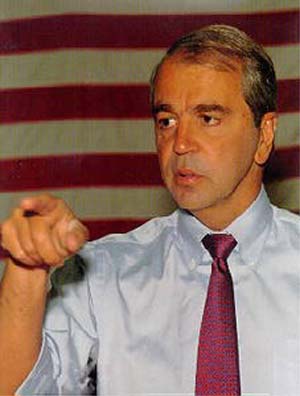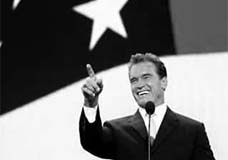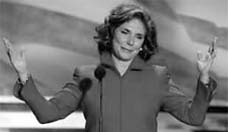
In 1972, councilors, like Kerry, were engaged in local politics. Little did they know they would become a star-studded political group. Councilor Paul Tsongas would go on to become a U.S. senator.
Kerry at center of '72 Vietnam debate in city
By JASON LEFFERTS, Sun Staff
LOWELL One night 32 years ago, two men who would become two of the Democratic Party's well-known figures stood toe-to-toe over the Vietnam war, an exchange that led to a contentious City Council debate.
On April 18, 1972, John Kerry, a war hero turned anti-war activist and a declared congressional candidate, wanted city councilors to approve a resolution condemning the war. Kerry had said many times in the preceding months since his return from Vietnam that the war was wrong.
At a 1971 anti-war protest in the nation's capital, Kerry said he tossed away his combat medals to protest the government's military action.
Kerry's anti-war crusade played a major part in his campaign for the Fifth Congressional District seat then held by Lowell's F. Bradford Morse.
In his appearance before Lowell's elected leaders, Kerry was questioned sharply by Councilor Phil Shea, a hard-nosed local politician who believed the Democratic candidate's anti-war resolution was politically motivated.
Shea, it appears, was ahead of his time. He brought up several key issues that are resonating today on the national scene as Kerry, a U.S. senator for 22 years, makes a bid for the U.S. presidency.
Thirty-two years ago, the young councilor questioned the young candidate on Kerry's testimony before the Senate Foreign Relations Committee, his decision to return his combat medals and his anti-war activism.
Shea also confronted Kerry on a little-publicized fact: Kerry had filed for and taken a Vietnam bonus of $300 from the state of Massachusetts. All returning Vietnam veterans were eligible to receive the money. The Sun, through a Freedom of Information Act request, has received a copy of Kerry's bonus check. It was issued on Dec. 17, 1969, and authorized by then-state Treasurer Robert Q. Crane.
As Kerry was running for Congress, Shea tried to show the inconsistency in Kerry's stance against the war. If you returned your medals in protest, Shea asked Kerry, why didn't you return your bonus money?
Kerry told Shea and the seven other councilors present that he returned his medals to make a point and would do the same with the money. The Massachusetts Treasurer's Office, which issues the bonus checks, has no record today that Kerry followed through on his promise.
The Shea-Kerry exchange over the bonus check was never publicized, largely because it was a secondary issue to the main event Kerry's anti-war resolution that was being championed by Councilor Gail Dunfey, a 21-year-old college student.
Carol Giacomo, who covered the 1972 council meeting for The Sun, made no mention of the exchange in the story she wrote that appeared in the April 19 edition. Instead, she focused on Dunfey's resolution, which called for an immediate withdrawal of all U.S. forces from Vietnam, and a counter-proposal put forth by Councilor M. Brendan Fleming, who urged President Nixon to continue an orderly withdrawal and "honorable cease fire."
The resolutions were a political football for councilors. Normally, they'd vote on street repairs and committee appointments, but now they were thrust into a debate that was dividing Americans and communities across the nation. Their own feelings would be rubbed raw by debate that would follow.
Some councilors were reluctant to take on the controversy, others were torn by it, and still others had gone from supporting the war to opposing it as the conflict dragged on and the casualties continued to mount.
In 1972, councilors, like Kerry, were engaged in local politics. Little did they know they would become a star-studded political group. Councilor Paul Tsongas would go on to become a U.S. senator. Ironically, Kerry would one day take Tsongas' seat in the Senate when Tsongas decided to step down to battle cancer. Shea would become a state representative. Councilor Robert Kennedy would become a Middlesex County Commissioner and director of the Lowell Regional Transit Authority. Fleming would be mayor a few years later.
Other councilors that night were: Charles A. Gallagher, Leo J. Farley and Richard Howe. Mayor Ellen A. Sampson was absent. Sampson, Gallagher, Farley and Tsongas are all deceased; Howe is still a councilor.
Despite the high-profile issue, surviving councilors don't remember the Kerry-Shea exchange, or do not want to talk about it today. Kerry's campaign did not return repeated calls for comment.
Yet, it is clear the confrontation occurred. In records obtained by The Sun from City Hall archives, the April 18, 1972, meeting is meticulously chronicled by the late City Clerk William Busby. Busby, known for his accuracy, wrote that Kerry almost didn't get a chance to speak before the council. Shea objected because Kerry was an announced candidate for Congress. Howe pressed Kerry's case, however, with a motion that passed 5-3. Fleming, Howe, Kennedy, Tsongas and Dunfey voted in the majority, while Shea, Gallagher and Farley were opposed.
Before Kerry's speech, four other Lowell residents were allowed to speak in support of the anti-war resolution. According to Busby's list, they were Mark E. Goldman, Charles N. Tsapatsaris, Kathy Desilets and Alan Solomont.
Solomont would later become a lifelong Kerry friend and a powerful national Democratic Party fund-raiser.
Busby filed no record of the speakers' remarks, although he wrote that Kerry was the only one to be questioned.
"Councilor Shea questioned Mr. Kerry about his Viet Nam service as well as his appearances before the Senate Foreign Relations Committee," wrote Busby. "He questioned his (sic) as to why, if he turned in his medals received for bravery in Viet Nam because he is now against the conflict; that he did not also return his bonus money for the same reasons. Mr. Kerry said that he returned his medals to make a point, and would return his bonus also if necessary."
If there was any more discussion between Shea and Kerry, it isn't recorded in Busby's six-page, single-spaced, typed report of the council meeting.
What happened next, according to Busby, was a political curveball thrown by Fleming. The councilor proposed a substitute resolution to Dunfey's. It encouraged President Nixon to "continue the orderly withdrawal of American forces" from Vietnam and "to pursue a policy toward a just and honorable cease fire agreement."
At that point, the council's divisions erupted, with Tsongas taking the lead.
According to Busby, (Tsongas) "said the Viet Nam issue has divided the country. He pointed out that the march two years ago that ended up in a confrontation at Gorham and Appleton streets between both factions, and the next day the City Council passed a 'Wake Up America Day Resolution' by a 7-2 vote, with he and Councilor Mahoney opposed. He said that he took a stand two years ago, and tonight felt that voting for Councilor Dunfey's Resolution would be a noble act and something the City Council could be proud of."
Tsongas, according to Busby's record, said "he could have supported Fleming's resolution two years ago, but time has changed (my) thinking on Viet Nam situation."
Sensing the escalating emotions, Gallagher tried to deflect the matter and send it back to Washington. "We have elected congressmen to represent us on these matters," Gallagher is quoted in Busby's notes. Gallagher adamantly stated he wouldn't vote for either resolution.
Shea weighed in by attacking anti-war protesters and Dunfey with equal fervor.
Busby wrote, "Councilor Shea said that two years ago the march was by a bunch of hoodlums who burned the American flag, carried Viet Cong flags and sang Viet Cong songs. Shea said this resolution before us (is) a piece of trickery on behalf of Councilor Dunfey."
Shea suspected that Dunfey was a Kerry supporter and was using the resolution to win support for the candidate.
Dunfey, however, wasn't intimidated and fired back. According to Busby, "Councilor Dunfey said that there is not much more than could be heard by deaf ears. She said we should worry about Viet Nam where we are spending American money and American people. She said, look what happened here tonight; she said people in Lowell can't think big things. They always want to know what are you getting out of it; they don't think you can be sincere."
At this point in the proceedings, Fleming defended his resolution. "Councilor Fleming said that the current escalation is a result of North Viet Nams (sic) invasion of the South," wrote Busby. "He said his resolution was an honest one."
Howe then let his torn feelings be known.
"Councilor Howe said there was no one in the country more discouraged over the Viet Nam war than he was," wrote Busby. "He said it is obvious that International problems are not as serious as the problems in our Country. He said both the proponents and opponents have legitimate issues."
Howe said he was not "totally opposed" to Fleming's motion "as it was more in line with his own thinking and feelings on the matter. He said he would not be able to vote for Councilor Dunfey's resolution unless it contained the contingency for the release of all prisoners of war."
Howe finished by moving for a one-week delay on the resolutions. In a 5-3 vote, the council agreed.
Neither resolution ever was approved. On April 26, Fleming's resolution garnered only one vote his own. Dunfey's received four Howe, Tsongas, Kennedy and Dunfey. A majority of five was needed for approval. Other councilors refused to vote on the matter, thus killing the initiatives but not the tension.
Looking back, Solomont said Shea's questioning was politically motivated.
"Shea was being Phil Shea," he said, acknowledging Shea's hard-nosed political reputation. "I don't think he was supportive of John's candidacy. It was really a political thing with him."
Solomont added that, 32 years later, it's improper to assail Kerry's stance on the war when he returned.
"This is absolutely revolting, what's going on," Solomont said, alluding to the anti-Kerry campaign launched by the Swift Boat Veterans for Truth. The group, which has been linked to Republican party operatives, has produced ads saying Kerry lied about his service record and his medals. None of the accusations has proven true.
The discussion at the 1972 meeting also re-ignites the parsing of the words "ribbons" and "medals."
In recent years, Kerry has admitted he gave back ribbons, not medals, during a protest in Washington, D.C.
"As part of a ceremony to try and reach America and show the country how much we veterans wanted the war to end, veterans returned to the government everything from dog tags to medals to the ribbons which symbolized our medals, to draft notices to photos, you name it," Kerry told The Sun earlier this year. "I returned my ribbons, and separately, privately returned medals given to me by two veterans who couldn't be there."
Shea and Dunfey declined to comment for this story. Fleming, Kennedy and Howe said they don't remember Kerry's appearance before the council, although Howe said he recalls the anti-war resolution fight.
"I thought the issue was a critical one that could be addressed by all state and local governments," Howe said. "What we tried to do is get some kind of consensus that the message had to get out that the country needed to end its involvement in Vietnam."
Eventually, President Nixon withdrew all U.S. troops from Vietnam and a cease-fire was arranged.
John Kerry, a war hero turned anti-war activist, kept his Vietnam combat medals and his Massachusetts bonus money.
Sun reporter Jason Lefferts compiled all the information appearing in this report. The article was co-written by Lefferts and Jim Campanini, The Sun's editor.



